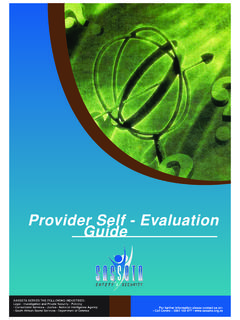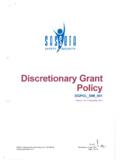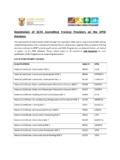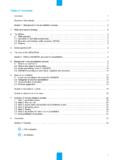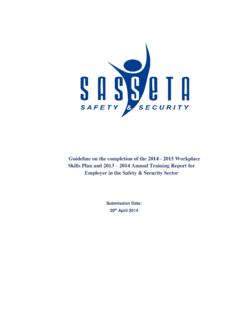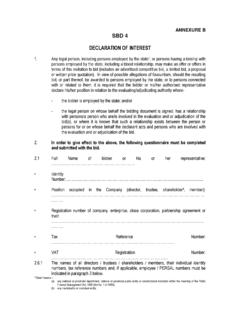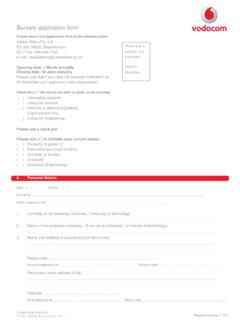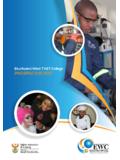Transcription of Definition of governance - sasseta.org.za
1 MANDATORY GRANTS 1 SASSETA -your partner in skills developmentWhat is a Mandatory Grant? It is a grant designated to fund the education and training programmes as contained in the Workplace Skills Plan (WSP) and Annual Training Report (ATR).Purpose of the grant: Intended as an incentive to employers to plan and implement training for their employees. Promote NQF registered qualifications to address scarce and critical skills needs. Improve the quantity and quality of labour market information received by SETA -your partner in skills development2 Mandatory Grants Qualifying CriteriaSASSETA will pay mandatory grants to an employer who has met the following criteria: Has registered with the Commissioner of SARS Has contributed levies directly to Commissioner within the specified timeframe Is up to date with levy payments at the time of approval. Has submitted WSP/ATR contributing to the SASSETA SSP Proof or evidence of consultation with organized labor is provided and signed offSASSETA -your partner in skills development3 Mandatory Grants Qualifying Criteria SASSETA will pay mandatory grants to an employer who has met the following criteria: Where the employer is newly registered, their first time submissionis due within 6 months after registering the company with SARS and CIPRO The employer should have submitted by the due date 30 April 2018 Companies should ensure that they are contributing levies to the correct SETA4 SASSETA -your partner in skills developmentMandatory Grant Payments Employers will only be paid if their respective applications have been approved by SASSETA The employer will be paid 20% of the total levy paid to SARS as Mandatory Grants.
2 At least 80% of Levies will be allocated to Discretionary Grants for PIVOTAL programmes. The mandatory grant will be paid quarterly to the employer. Failure by the employer to claim the mandatory grants will result in their levies being transferred toward Discretionary Grant funding by 15 August of each -your partner in skills development5 Grant Payment DatesQuarterPayment date Quarter 130 June 2018 Quarter 230 September 2018 Quarter 330 December 2018 Quarter 430 March 20196 SASSETA -your partner in skills developmentAdvertSubmission of WSP and ATRAORE valuationPre-approvalFinal ApprovalPaymentPayment ConfirmationMandatory Grants Process7 SASSETA -your partner in skills developmentWSP and ATR SupportShould you require any assistance in terms of submitting your WSP and ATR please contact: The SASSETA Call Centre 011 087 5555 Email: Mandatory Grants Team at the SASSETA offices8 SASSETA -your partner in skills developmentQuestions?
3 SASSETA -your partner in skills development9 THANK YOUYour participation is greatly appreciated!SASSETA -your partner in skills development10 SASSETA -your partner in skills developmentInputs The Organising Framework for Occupations (OFO)What is the OFO? OFO stands for the Organizing Framework for Occupations and is a skill-based coded classification system, which encompasses all of the occupations within the South African context. It is a key tool for identifying occupations in the SA labour market in terms of supply and demand needs (scarce and critical skills priorities) and informs the development of occupational qualifications. The classification of occupations is based on a combination of skill levels and skill specializations which makes it easy to locate a specific occupation within the framework. It aims at capturing all jobsin the form of -your partner in skills development1 DefinitionsWhat is a job?
4 A job is a set of tasks and duties carried out or meant to be carried out, by one person for a particular employer, including self-employment. Example: Controlling access to establishments, monitoring and authorizing the entrance or departure of employees and is an occupation ?An occupation is a set of jobs whose main tasks are characterized by a high degree of similarity across a range of contexts with similar knowledge : (Jobs: Patrolman, Watchman, Security Guard) = Security Officer (Occupation)SASSETA -your partner in skills development2 How is the OFO Structured?Occupations are classified under a Major Code:2015-1 Managers,2015-2 Professionals,2015-3 Technicians and associate professionals,2015-4 Clerical support workers,2015-5 Services and sales workers,2015-6 Skilled agriculture, forestry, fisheries, craft and related trades workers, 2015-7 Plant and Machine Operators and Assemblers, and 2015-8 Elementary -your partner in skills development3 Our sector is dominated by these three categoriesWhy is the OFO necessary?
5 To enable the identification of most in demand occupations (scarce, critical and PIVOTAL skills) in the labour market. Employers must use it to reportscarce, critical and PIVOTAL skills when developing Annexure 2 (also known as the Workplace Skills Plan) To track the scarcity of skills on the basis of labour market demands. To establish how the scarcity is manifested across the sectors and subsectors and how this informs strategies to reduce the scarcity (attain supply and demand equilibrium in the labour market) For employers to provide information at occupational level so that SETAs can identify the common skills development needs and interventions. This links directly to the development of occupational -your partner in skills development4 What is the purpose of the OFO Codes? Provides a common language when talking about occupations. Groups occupations according to similar tasks, skills and knowledge. Provides a framework to analyse jobs and identify similar tasks and skillsin order to map the jobs to appropriate -your partner in skills development5 Who use the OFO?
6 SETAs are compelled to use it in the SSP to reflect sector skills needs -which are occupations where employees are required. Employers use the OFO on Annexure 2 [WSPs/ATRs]. Quality Council for Trades and Occupations (QCTO) for occupational qualification development process and certification. NAMB (National Artisan Managing Body) for implementation of listed -your partner in skills development6 Why do we use OFO Codes? Provides consistency in the way occupations are named and reported. Enables compilation of scarce and critical skills lists using occupational codes. Enables monitoring of occupations to inform demand and supply in order to avoid -your partner in skills development7 Example ..19 SASSETA -your partner in skills development8 Generic Job TitleJob Purpose / OutputOFO DescriptorOFO OccupationOFO CodePolice OfficerMaintains publicorder, enforce laws and patrolling public areas Maintains public order, and enforces laws by investigating crimes, patrolling public areas and arresting (SAPS)2015-541202 LawyerProvidelegal advice and provide legal documentsProvidelegal advice, prepares and drafts legal documents and conducts negotiations on behalf of clients on matters associated with the.
7 Generic Job TitleJob Purpose / OutputOFO DescriptorOFO OccupationOFO CodeBusiness AnalystTo develop strategic financial analyses to enhance business planning and revenue andor incomeDevelops and implements financial plans for individuals and organisations. Advises on investment strategies and their taxation implications, securities, insurance, pension plans and real Investment Advisor2015-241301 Business AnalystTo analyse and develop ICT system requirements to enable and enhance organisational performanceEvaluates processes and methods used in existing ICT systems. Proposes modifications, additional system components or new systems to meet user needs as expressed in specifications and other Systems Analyst2015-251101 Example: Same generic job title -different occupations and codes 20 SASSETA -your partner in skills development9 OFO, Skills Levels, & NQF LevelsSASSETA -your partner in skills development10 OFO, Skills Levels, & NQF LevelsNSDSNQF LevelSkill LevelTask LevelDescriptionGradingOFO Major GroupsHigh7 to 1045 Strategic19 to 262.
8 Professionals1. Managers4 Tactical14 to 18 Intermediate633 Specialised9 to 133. Technicians and Associate Professionals522 Discretionary4 to 84. Clerical and Support Workers5. Services and Sales Workers6. Skilled Agricultural, Forestry, Fishery, Craft & Related Trades Workers7. Plant and Machine Operators & Assemblers4 Entry3211 Basic1 to 38. Elementary Occupations1 Tips for using theOFO Start at the top of the OFO major group to determine which of the major group descriptors best represent the stated descriptor. Remove indicators of seniority such as chief, senior, junior, etc. Which of the sub-major group, minor group, unit group best represent the descriptor. Find the most suitable six digits -your partner in skills development11 SASSETA -your partner in skills developmentTHANK YOUQ uestions?WELCOME to the SASSETA2018/19 Discretionary Grant PresentationSASSETA -your partner in skills development The SP is developed to enhance SASSETA s efforts to support government s goals and objectives, focusing on increasing the foot print in the rural areas and municipalities.
9 SASSETA supports the New Growth Path Accord 6: Youth Employment Accord which sets out the joint commitment to prioritize youth employment and skills development. Our aim -to develop mechanisms that will create a conducive climate for creating learning opportunities amongst unskilled people of South Africa especially the STRATEGIC PLANSASSETA -your partner in skills development The mechanisms will include:- The provisions of bursaries; The provisioning of opportunities for workplace experience; and Entering learners into skills programmes and learnership. Artisan TrainingStrategic PlanSASSETA -your partner in skills developmentThe SASSETA will annually approve a DG Policy in accordance with the SETA Grant regulation of 2012, which will determine how the funds will be allocated. The SASSETA may determine and allocate Discretionary Grants in support of the following: NSDS III targets Scarce and Critical skills identified in our SSP Annual Performance Plan PIVOTAL programmes NGO/CBO/NPO/ and Trade Unions Bursaries for employed and unemployed learners National Skills PrioritiesAllocation of Discretionary GrantsSASSETA -your partner in skills development Employers who are within the jurisdiction of SASSETA who are up to date with their levy payments or who are exempted in terms of the SDLA of 1998 Employers who have submitted the WSP /ATR Only Companies employing less than 50 employees should complete the PIVOTAL PLAN Template as found on the website Accredited Private Providers (only for projects where providers are required) Registered NGOs, CBOs , NPOs and Trade Unions Unemployed Learners (only for bursaries and the Candidate Attorneys Candidacy Program)Who qualifies?
10 SASSETA -your partner in skills development Applicants should submit their Discretionary Grant application/s using the prescribed SASSETA Discretionary Grant Application Forms in line with the Discretionary Grant Policy. Discretionary Grant Application forms include: Public Employers Application Form Private Employers Application Form Training Provider Application Form Unemployed Learners Bursary Application FormHow to applySASSETA -your partner in skills developmentApplication forms must be complete and the following attachments must be appended as required: Company registration documents Skills Development levy Number or Proof of registration for levies under SETA 19 or proof of exemption PSIRA registration or Law Society registration or relevant registration with other professional bodies for 2018 Proof of accreditation with lists of programs with the relevant SETA or other Quality Assuring Body for the specific learning programme applied for Assessor and Moderator details for the specific qualificationHow to apply (CONTINUED)SASSETA -your partner in skills developmentApplication forms must be complete and the following attachments must be appended as required.


